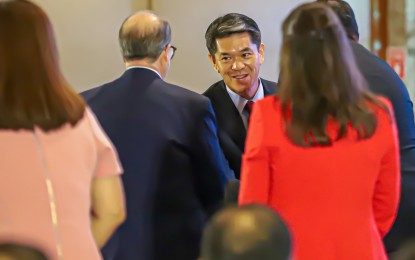News
SCS, reg’l woes call for ‘new levels’ of PH-Japan cooperation: envoy
By Joyce Ann L. Rocamora, Philippine News Agency

Since assuming his post in Manila, Endo said the South China Sea has remained a “flashpoint of heightened tensions” in the region. (PNA file photo by Robert Alfiler)
MANILA – The Philippines and Japan must take their cooperation to “new levels” against the backdrop of complex challenges besetting the region, including the rapid Chinese militarization in the South China Sea, a Japanese official said Friday.
“There are many reasons why Japan-Philippine cooperation should be taken to a new level. The security landscape, both regionally and globally, has grown increasingly complex and unpredictable, marked by a series of turning points,” Japanese Ambassador Endo Kazuya said in a Stratbase ADRI forum in Makati City.
Among these, he said, are China’s “rapid and opaque” military build-up, repeated unilateral attempts to change the status quo by force in the East and South China Seas, North Korea’s escalating and serious military provocations, and the “alignment among China, Russia, and North Korea”.
Since assuming his post in Manila, Endo said the South China Sea has remained a “flashpoint of heightened tensions” in the region.
For the envoy, facing these severe and complex security challenges requires the two states to “redouble current efforts” and forge enhanced relations.
Endo also underscored the importance of a “regional deterrence” to ensuring stability in the region.
Meanwhile, he said Japan’s participation in the maritime cooperative activity in the Philippine Exclusive Economic Zone in June, August, September, and December last year was testament to its “tangible demonstrations [and] steadfast dedication to upholding the principles of freedom of navigation and overflight”.
Military access deal
Once the Philippine-Japan Reciprocal Access Agreement (RAA) comes into effect, Endo said the two nations’ level of cooperation will also enter a new phase.
Through this deal, Endo said the Japan Self-Defense Forces will be able to engage in advanced training with the Armed Forces of the Philippines, particularly in the joint Philippines-US exercises such as Balikatan, Kamandag, and Sama-Sama.
As to how soon Tokyo could increase its engagement in the activities, Endo said it would depend on the “processes of the ratification”.
“Japan has been an active participant as observers to the Balikatan and we also need to plan ahead. So, we’ll see,” he told reporters in a separate interview.
The Philippine Senate ratified the RAA in 2024, which now awaits the concurrence by the Japanese parliament to take effect.
“We hope that the RAA will be concurred by the Japanese Diet at the earliest possible time but we are not yet sure when,” Endo said.
“After the concurrence by the Japanese Diet, we will go through some procedural processes and after that it will be officially ratified by both governments and will take into effect,” he added.





















